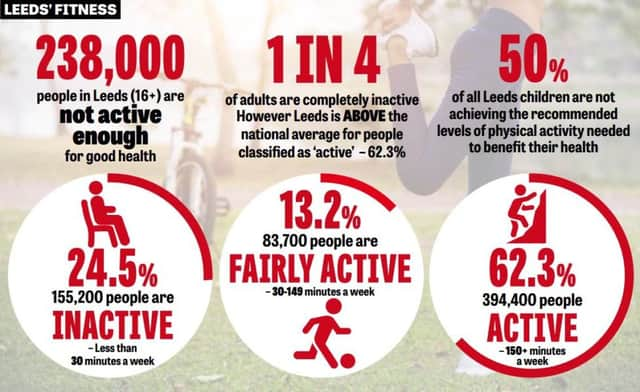238,000 people in Leeds '˜not getting minimum levels of exercise'


That’s the view of a Leeds City Council watchdog panel, which has heard that 238,000 adults in the city are not getting the recommended minimum levels of exercise.
Half of all children are also not moving enough, and the knock-on effects of both are highly damaging.
Advertisement
Hide AdAdvertisement
Hide AdThe YEP reported yesterday that a new health drive aims to get Leeds moving, cut rising obesity levels and close a 10-year life expectancy gap between the city’s healthiest and unhealthiest areas.
Councillor Alan Lamb, chair of the council’s sport and culture scrutiny panel, said: “The gains on offer from embedding an active lifestyle are so enormous and this work so important.
“If everyone in the city was active in the recommended time, education outcomes would improve, employment would improve, the pressure on the criminal justice system and the police would fall, health outcomes would improve, people would live longer and have happier, healthier lifestyles, and the costs to the NHS would fall.”
Yesterday’s meeting was told that while the city’s major sports successes - for example in cycling and triathlon - had done a lot to encourage participation, “it’s not just about elite success and winning medals - but about communities as well.”
Advertisement
Hide AdAdvertisement
Hide AdThe panel heard that an erosion of public green spaces over the last 15 or 20 years has been a major factor in reducing people’s opportunities to get active.
Coun Sandy Lay (Lib Dem, Otley and Yeadon) suggested the acadamisation of schools had also had an impact on “the ability of people to use those green spaces and indoor spaces”.
He also suggested flaws in the planning system were a factor as they foster an environment that “puts cheap, identikit communities together” rather than looking at “the wider needs of a community” and people’s basic ability to move around.
Meanwhile councillor John Illingworth said the key issue was inequality of provision.
“Sport provision in general is very patchy,” he said.
Advertisement
Hide AdAdvertisement
Hide Ad“Some parts of the city have very good provision, and other parts very poor. If you don’t have somewhere nice to do it, then you tend not to do a sport.”
Rob Young, who is leading the Sport Leeds project, told the meeting that physical activity had been proven to be “a great preventative tool” for health and behavioural issues.
“It is a long term approach. Transformation isn’t going to happen overnight,” he said.
“We have got examples we can learn from, like cycling, and how the Tour de France and Tour de Yorkshire has helped to drive some of that change.
Advertisement
Hide AdAdvertisement
Hide Ad“If you reflect back on that journey, it’s a big, difficult task to try and change the cycling habits of a city, but actually you’re a long way on.”
But he acknowledged the ultimate aim was to get people moving, and “it doesn’t all have to be about big shiny leisure centres and sport centres”.